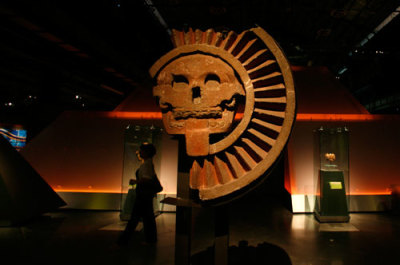NASA Scientists Negate 2012 Apocalypse Rumors
Experts from NASA say that it doesn't take a rocket scientist to know the world won't end in 2012.

The beginning of the New Year is reigniting debate over the prediction of the end of the world, connected to the end of the ancient Mayan calendar.
Space.Com reported last month that the Mesoamerican civilization recorded a 365-day calendar not unlike the modern Gregorian version. The Mayans measured time with a short-count calendar lasting 52 years, and a long-count version completed every 5,125 years. Some believe that the end of the long-count cycle on Dec. 21, 2012 marks the apocalypse given the Mayan calendar stops on that date.
"This long-count calendar is coming to an end on Dec. 21," said Don Yeomans, manager of NASA's Near-Earth Object program office at its Jet Propulsion Laboratory, to Space.com last month. "Of course, a new calendar would start on Dec. 22. It would be like saying our calendar ends on Dec. 31, and that's the end of time, the end of days, that's it, no regard for how a new cycle would begin."
Space.com said that the date also marks the winter solstice, the longest night of the calendar year. Given the calendar's ending coincides with such an astronomical event, Yeomans said that many people were giving the date undeserved significance.
"Sleep well on Dec. 21 of next year," Yeomans said. "The Maya never predicted the end of the world occurred at that time."
All the same, Yeomans said, many apocalypse theories had cropped up around the date. One such doomsday prophecy, he said, concerns Nibiru, a theoretical planet that will complete its massive orbit around the solar system next December and reenter the Milky Way, wreaking massive destruction. Such a planet's reappearance, he said, would exert extreme gravitational pull on other planets, throwing them wildly off balance.
David Morrison, a NASA senior scientist, challenged the Nibiru theory in an October YouTube video. In it, he argued that an interstellar body like Nibiru would already be visible and threatening planetary orbits if it were passing near the Milky Way. The lack of such evidence, he argued, eliminates the potential planet's existence.
"Nibiru doesn't exist," Morrison said in the video. "We can't see it, we can't detect its gravity and we don't see a signature of its previous passages as there weren't any. We don't have to worry about this hoax."
Yeomans said other apocalyptic theories included gravitational damage from the planets lining up, solar energy storms and the Earth's magnetic poles shifting. He said that such scenarios couldn't be predicted accurately or were overstated in the danger they presented.
Solar storms, for example, have occurred in the past and usually only damage electronics if anything at all. Polar shifts, he added, are unlikely as the Earth's moon stabilizes its orbit. As for the gravitational pull of other planets, he said we experience such forces daily without any negative consequences.
Yeomans said that science goes a long way in separating fact from fiction in apocalypse theories. By testing out potential prophecies, he said people could investigate the future without letting their imaginations overwhelm them.
"For all claims of disaster or dramatic changes in 2012, the burden of proof is on the people making those claims," Yeomans said in a November NASA blog. "There is no credible evidence for any of the assertions made in support of unusual events taking place in December 2012."

 The Christian Post Daily Report 01.02.12
The Christian Post Daily Report 01.02.12




















